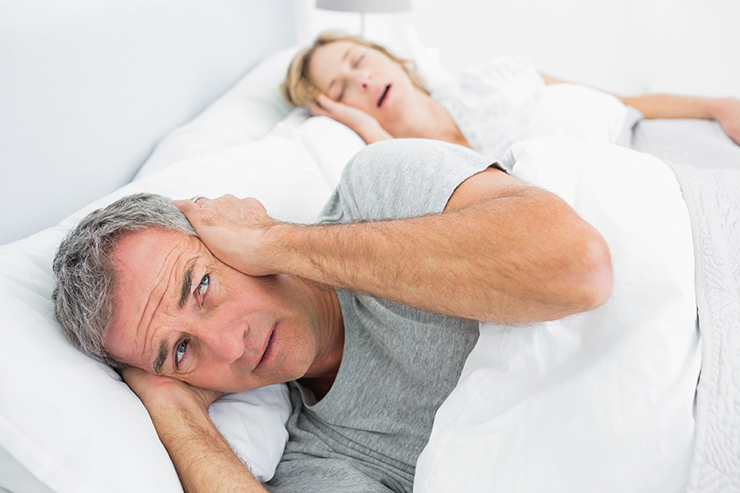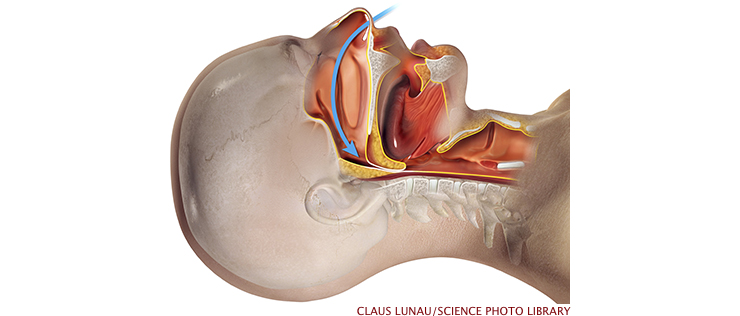ENTER YOUR EMAIL TO RECEIVE OUR WEEKLY NEWSLETTER
Is Snoring Compromising Your Health?
Some 37 million Americans snore regularly according to the National Sleep Foundation, so if you snore you’re not alone.
By Georgetta Lordi Morque

Snoring is sometimes featured as an amusing habit in silly cartoons and comedy routines. Yet snoring is no laughing matter and may even signify a genuine medical issue. Men and also women often don’t even realize they are snoring. For couples, one partner may wake up the other and ask him or her to stop. Sleep is then disrupted for both individuals and this can create havoc in the bedroom.
Snoring is actually the sound of resistance in the upper airway when there is an obstruction as air tries to move across the soft palate in the airway passage. Simply put, it is a sleep disorder. But that’s not uncommon. According to the American Sleep Association, 50 to 70 million adults in the U.S. suffer from sleep disorders. Men are initially the offenders; women tend to develop sleep disorders later in life. The National Sleep Foundation reports that 43 percent of perimenopausal women experience symptoms of a sleep disorder, but that number increases to 50 percent in postmenopausal women. And at this stage of life, snoring can be more common and more severe.
Dr. Michael Gelb, DDS, MS, a sleep apnea and sleep disorders specialist in New York and multiple Top Doc New York award winner, explains that sleep issues start in perimenopausal women—when estrogen levels dip—because the receptors that keep the tongue forward become less active causing the tongue to drop back collapsing the airway. Other contributing factors are weight gain and increased fatty tissue in the neck that can put pressure on the airway and the loss of tone in the throat. As a result, there is a decrease in the amount of oxygen that enters the body and sleep becomes fragmented.
“Snoring is a sign of poor airway health,” says Dr. Gelb, who practices at the Gelb Center in Manhattan and Westchester, which is internationally recognized for its treatment of sleep disorders and also headaches, TMJ and a wide range of orthodontal issues. “If you’re snoring at night, you’re most likely not feeling good in the morning,” says Dr. Gelb. Snoring and the fatigue it causes can lead to problems such as inflammation in the body, high blood pressure, poor memory and concentration, headaches, premature aging and cardiovascular conditions.
Dr. Gelb, who has been in practice for three decades, has seen patients who have suffered miserably for years due to snoring and compromised nighttime breathing. “Snoring can also progress to intermittent sleep apnea or UARS, upper airway resistance syndrome,” he warns. However, just because you snore doesn’t mean you have sleep apnea, a potentially dangerous condition that can cause your breathing to stop repeatedly if it’s not treated. To be safe, it’s wise to get snoring checked out.
Alcohol, smoking, sedatives, allergies and sleeping on your back can make snoring worse. Dr. Gelb, who is always at the forefront of the latest research, recently uncovered new studies indicating that night guards—devices that protect tooth enamel and fillings from grinding and clenching—may also make snoring worse. “There’s a 50 percent chance that a night guard could be closing the airway by pushing the jaw back,” says Dr. Gelb.

Snoring is caused by the vibration of respiratory structures due to
obstructed air movement (blue arrow). The soft palate in the back of the throat
relaxes and obstructs the passage of air.
. . . . . . . . . . . .
But if you’ve been losing sleep and fighting fatigue, don’t despair. Thankfully there are many advancements in the diagnosis and treatment of snoring and other sleep disorders. If you don’t know if you do snore, Dr. Gelb recommends the App, SnoreLab, which can help identify and analyze snore patterns. The Gelb Center also has simple, patient-friendly at-home sleep tests to assess sleep problems.
Dr. Gelb’s main recipe to combat snoring is to open the airway that will allow more oxygen into your body. There are over-the-counter products that can help improve your breathing, such as Mute, a nasal stent that is designed to open and dilate the nasal passages. There are also oral appliances that work by keeping your tongue and palate in a forward position, which helps widen the back of your airway. Dr. Gelb recently invented the ACG, Airway Centric Guided Day Night Appliance System. Each individual differs so a careful assessment of your sleep and specific snoring problem will determine the best type of device or treatment.
Along with improving your airway health, Dr. Gelb’s recommends practicing good sleep hygiene for better sleep, such as not eating after 8 p.m., relaxing before going to bed, staying away from blue light and screens one hour before bedtime and not sleeping with your cell phone.
Dr. Gelb is passionate about helping people achieve quality sleep and finds his work very rewarding. In 1990 when he took over as Director of the NYU TMJ and Orofacial Pain Program, he became fascinated by a lecture on how TMJ patients could benefit from treating their airways and this in turn helped with sleeping. Many TMJ patients or those experiencing head and neck pain may also have sleep disorders and end up getting sleep care at the same time. Sleep disorders and airway health then became the focus of Dr. Gelb’s practice. He is the co-author of Gasp: Airway Health—The Hidden Path to Wellness.” His father, Dr. Harold Gelb, founded The Gelb Center.
. . . . . . . . . . . .
Sleep Disorder Centers In New York City
The Gelb Center of NYC
535 Madison Avenue, 19th Floor, NYC 212-752-1662
The Gelb Center also operates out of Westchester County:
12 Old Mamaroneck Road, Suite 1C, White Plains 914-686-4528
The Center for Sleep Medicine at New York-Presbyterian/Weill Cornell Medical Center
425 East 61 Street, 5th Floor, NYC 646-962-7378 (REST)
New York Sleep Disorder Center
2 Locations: 2951 Grand Concourse, Suite 1A. Bronx; 625 East Fordham Road, Bronx 718-220-4210
NYU Langone Sleep Disorders Center
530 First Avenue, Suite 5D, NYC 212-263-8423
Lenox Hill Hospital Center for Sleep Medicine
100 East 77th Street, NYC 212-434-4960, Opened March, 2017
The Mount Sinai Integrative Sleep Center
Two locations: 140 Madison Avenue, 4th floor, Room 418, NYC 212-241-5098;
11 East 26th Street, 13th floor, Suite 1302, NYC 212-481-1818
. . . . . . . . . . . .
Georgetta Lordi Morque is an award-winning freelance writer and public relations consultant who focuses on sports, fitness and health.
You may enjoy other NYCitywoman articles by Georgetta Lordi Morque:
Facial Acupuncture for Skin Rejuvenation
Collagen: Maintaining A Youthful Complexion
Stand Up! The Road to Better Posture
Specialists in Nutrition and Weight Control
How to Soundproof Your Apartment
Anti-Aging Benefits of Cosmetic Dentistry
New York City: A Mecca for Yoga Classes
Where to Get the Best Facial in New York City
Fight Aging with Strength Training











